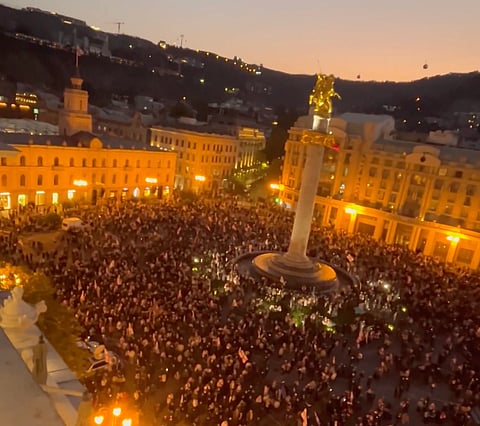

Police in Georgia deployed water cannons and pepper spray on Saturday to disperse protesters attempting to storm the presidential palace in Tbilisi.
The clashes occurred during municipal elections boycotted by major opposition blocs protesting the governing Georgian Dream party's policies.
Tens of thousands rallied in the capital, waving Georgian and European Union flags while carrying placards supporting EU membership.
The opposition accuses Georgian Dream of steering the country toward Russia's influence and away from democratic goals enshrined in the constitution.
Georgian Dream halted EU accession talks last year following a parliamentary election victory that opposition figures claimed was rigged.
This decision sparked ongoing demonstrations met with government measures including mass arrests, fines, and laws targeting demonstrators, rights groups, and independent media.
Critics view some of these laws as modeled on Russian legislation used to suppress dissent.
Rally organizers, including opera singer Paata Burchuladze, urged protesters to reclaim power from the people and called for arresting senior Georgian Dream figures.
A group of demonstrators marched to the presidential palace, smashed its gate, and tried to force entry before riot police repelled them.
Some protesters then barricaded a nearby street and lit fires, facing off against security forces.
Political analyst Giorgi Rukhadze described the municipal vote as a mock election and advocated non-obedience through peaceful protests.
The opposition promised a peaceful revolution ahead of the vote, which saw preliminary turnout below 30% in the first half of the day.
Georgian Dream claimed victory in every municipality, according to the party.
The Central Election Commission reported no major disturbances and planned to announce results shortly after polls closed.
Unlike the 2021 local elections, major international observers from bodies like the European Parliament and OSCE were absent this time.
Local nongovernmental organizations also declined to monitor, citing repressive laws and a deteriorating political environment.
Protests have persisted since last October, reflecting frustration with jailed opposition leaders and attempts to shut down critical media.